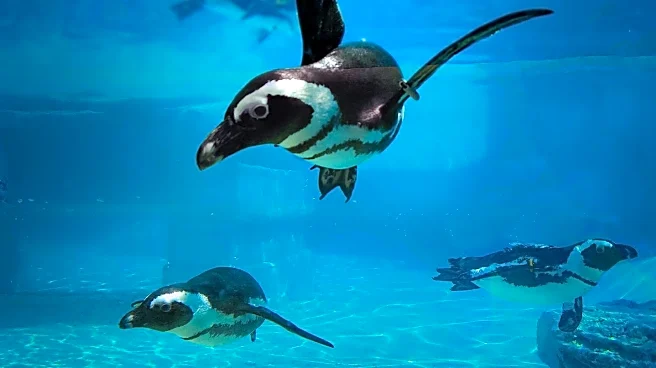What's Happening?
The New England Aquarium in Boston has created a specialized habitat for its aging penguins, known as the geriatric island. This initiative was inspired by the need to provide a safe and comfortable environment for older penguins like Lambert, a 33-year-old
African penguin who has lived at the aquarium his entire life. The geriatric island is designed to accommodate the physical limitations of older penguins, featuring flatter terrain and a carpeted path to facilitate easier movement. The island is separated from the main colony to prevent competition with younger, more aggressive penguins. This move is part of a broader trend in zoos and aquariums to adapt to the longer lifespans of animals in captivity compared to their wild counterparts.
Why It's Important?
The establishment of the geriatric island highlights the evolving responsibilities of zoos and aquariums in caring for animals that live significantly longer in captivity. This initiative not only improves the quality of life for aging penguins but also sets a precedent for other institutions to follow. By addressing the specific needs of older animals, the aquarium is ensuring that these creatures can live out their days with dignity and comfort. This approach may influence public perception and support for zoos and aquariums, emphasizing their role in animal welfare and conservation.
What's Next?
The New England Aquarium plans to continue monitoring the health and well-being of its aging penguins, providing regular checkups and treatments for common age-related ailments. The success of the geriatric island could lead to similar initiatives in other zoos and aquariums, promoting a more compassionate approach to animal care. As the concept gains traction, it may also encourage further research into the needs of aging animals in captivity, potentially leading to new standards and practices in the industry.
Beyond the Headlines
The creation of the geriatric island raises important ethical considerations about the treatment of animals in captivity. It underscores the need for zoos and aquariums to adapt to the changing needs of their inhabitants, particularly as they age. This development may also spark discussions about the balance between conservation efforts and the welfare of individual animals, prompting a reevaluation of how these institutions operate and their long-term goals.















